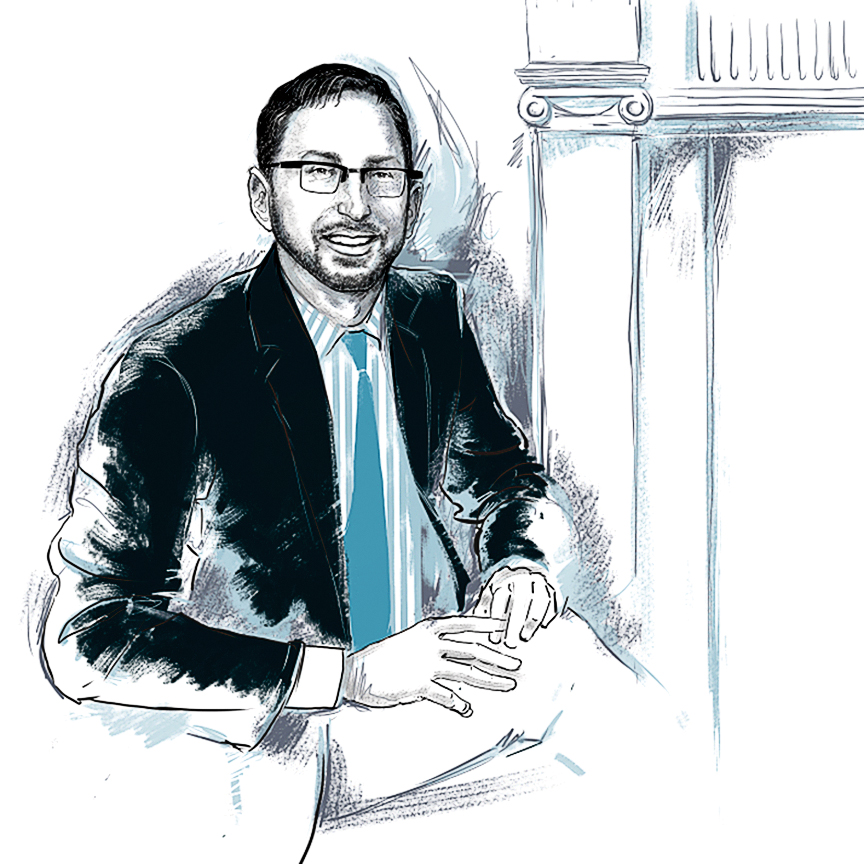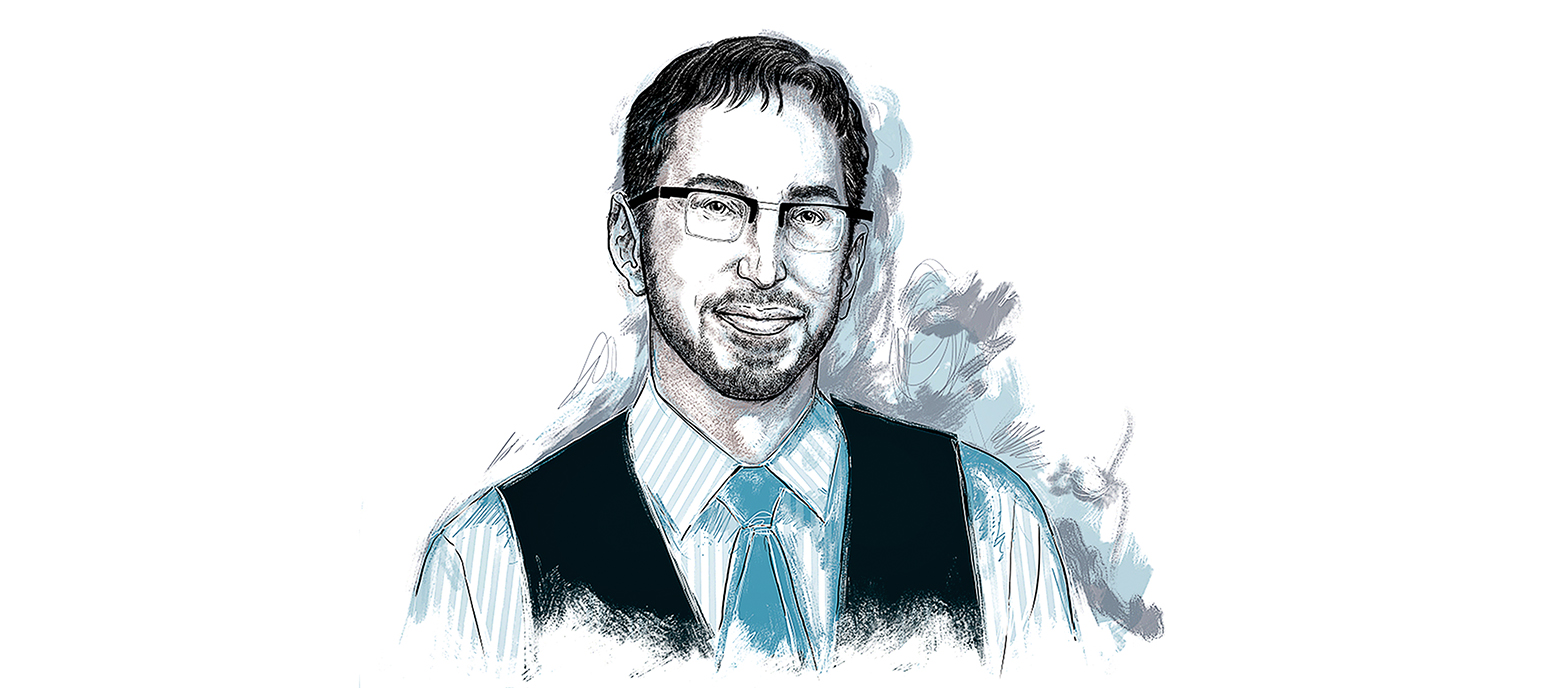In 1992, Jordan Atin, who was then an articling student at Fasken Campbell Godfrey, learned that he wouldn’t be hired back. He was disappointed, but not surprised: the economy was in recession, after all, and jobs were scarce. So, in 1993, he founded his own practice. “When you start a firm, you don’t have the luxury of choosing your cases,” he says. “I did everything: criminal, corporate, family and IP.” When a woman brought an estate-law matter to him, he took that on too, even though he hadn’t studied the area. He needed the work.
The case itself was unusual. The woman had recently divorced her husband, who, in a fit of spite, had revised his will and left all his assets to his sister. Then, he took his own life. “He even left his ex-wife a note saying, ‘You’re not getting anything,’” recalls Atin. As he researched the case, however, Atin realized that the will failed to mention the man’s most valuable assets. There was a life-insurance policy and RRSP, for instance, that still listed his ex-wife as the beneficiary. And there were real-estate holdings that were jointly registered in his ex-wife’s name. The man’s hastily drawn-up will would cover the most basic assets — such as the cash in his chequing account and his personal belongings — but it didn’t nullify his insurance policies, nor did it alter the ownership of his real estate. “In the end,” says Atin, “my client got nearly everything of value.”

Jordan Atin
Counsel, Hull & Hull LLP
Year of call: 1993
That case taught Atin an important lesson: if he was going to practise estate law, he’d have to dig deep into the financial profile of every client. “In lawsuits, the number-one claim against estate lawyers is that we do inadequate investigations,” says Atin. “Not all of us are asking the right questions or gathering the right information.”
Atin started to develop a specialty in estate law, and in 1999, he took a job as part-time counsel at Hull & Hull LLP, one of the foremost boutiques in the field. Under this arrangement, he would continue his solo practice, but he’d have an office at the firm, and he’d lend his research skills to cases it took on. “Jordan is an intellectual giant,” says Ian Hull, a founding partner of the firm. “When analyzing a problem, he can factor in analysis and caselaw I’d never think of.”
After two decades in estate law, Atin decided to modernize the practice area. “Aside from a word processor,” he says, “the process of making a will hasn’t changed in 500 years.” Knowing that estate lawyers often collect inadequate information, he wondered if a custom computer program could standardize the client-interview process and reduce the likelihood of oversights. So, in 2015, Atin and Hull co-founded a company, called Vested Software, and got to work on an application that would guide lawyers through the will-making process.
In 2019, eState Planner hit the marketplace. Here’s how it works: During client meetings, lawyers load the program and share their screen. Then, responding to virtual prompts, they interview the client and build both a family tree (which features detailed notes on each individual) and a detailed list of assets (including those that are jointly owned). The software ensures that lawyers ask all the relevant questions, not just those that pop into their heads. The final step is to drag and drop each asset to the place it’s destined to go when the client dies. All of the data is elegantly visualized, and the program generates the estate documents instantaneously.
These days, Atin’s schedule is packed. He’s a full-time parent to Spencer and Holly, ages 22 and 16. (His wife, Katie Hoffman, died in March of 2019.) He handles a full caseload. And Vested Software requires plenty of attention, too. The company has seven full-time employees and eState Planner has garnered subscriptions from 240 firms, a sizeable chunk of the Ontario market. “We continue to update the software as the laws change,” says Atin. When he retires, a long time from now, it’ll be up to date, reasonably priced and easily available — a legacy to the next generation of lawyers.
Timeline of an estate lawyer
1993: After completing law school at Osgoode Hall and articling at Fasken Campbell Godfrey, Jordan Atin co-founds Atin and Parker, a small full-service firm.
1994: After the firm’s first year in business, Atin’s partner quits law altogether. Atin Professional Corporation is born.
1995: Atin takes his first estate-law case and finds his niche. “I love the field,” he says. “It’s all about giving people peace of mind.”
1999: Atin joins Hull & Hull LLP as part-time counsel, while continuing his solo practice. “I give advice to Hull & Hull lawyers but don’t work directly on their files,” he says. “All I do is think and talk. It’s the greatest role for a lawyer.”
2006: Alongside Barry Fish and Les Kotzer, Atin publishes The Family War, a non-lawyer’s guide to estate litigation. The book, along with dozens of academic articles, establishes Atin as a thought leader in the field.
2012: Atin begins teaching a course at Osgoode Hall, called Wealth, Death and the Lawyer, which deals with estate law around the world.
2019: Atin and Ian Hull release eState Planner, a software application that streamlines the process of writing a will. In short order, 240 firms purchase a subscription.
This story is from our Summer 2021 Issue.
Illustration by Aaron McConomy.



